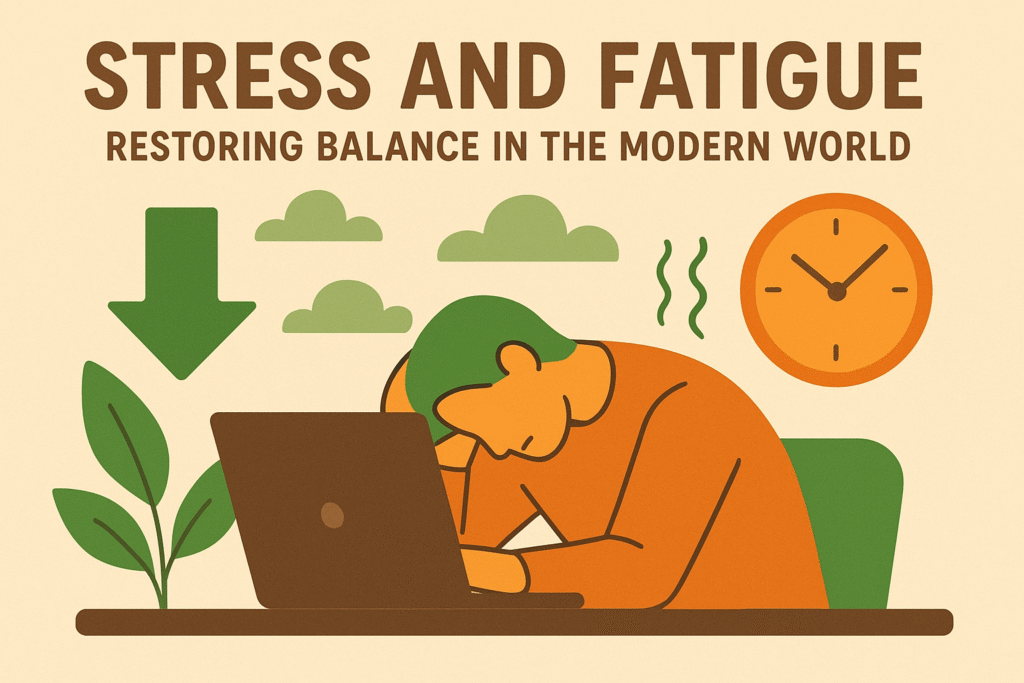In today’s fast-moving lifestyle, stress and fatigue have quietly become the most common yet overlooked health issues. They affect not only mental performance and productivity but also sleep quality, digestion, immunity, and hormonal balance.
While short-term stress can sharpen your focus, chronic stress and constant tiredness can lead to burnout — a condition that drains both your body and mind.
This article explores how to manage stress effectively, boost energy naturally, and regain your sense of balance using science-based strategies.
🔹 1. Understanding Stress and Its Hidden Effects
Stress triggers the “fight or flight” response, increasing cortisol and adrenaline to help you react quickly. But when these hormones stay elevated too long, they cause fatigue, anxiety, and even inflammation.
Over time, this constant alert mode can result in:
- Sleep disturbances
- Muscle tension and headaches
- Digestive problems
- Lowered immunity
- Emotional exhaustion
🔗 Read more: American Institute of Stress – What Is Stress?
🔹 2. The Link Between Fatigue and Lifestyle
Fatigue isn’t just about lack of sleep — it’s often a signal of imbalance in your nutrition, hydration, and mental recovery. Prolonged fatigue can reduce motivation, slow metabolism, and impact mood.
✅ Common Causes of Chronic Fatigue:
- Irregular sleep schedule
- Poor diet and dehydration
- Overworking without rest breaks
- Excessive caffeine or alcohol intake
- Sedentary habits or lack of sunlight
🔗 Evidence: Cleveland Clinic – Causes of Fatigue
🔹 3. Practical Stress Management Techniques
Managing stress doesn’t mean eliminating challenges — it means improving your body’s ability to adapt.
✅ Proven Methods to Reduce Stress:
- Deep breathing & mindfulness — slows heart rate and lowers cortisol.
- Regular physical activity — releases endorphins that boost mood.
- Meditation or prayer — improves emotional resilience and focus.
- Spending time in nature — reduces anxiety and restores mental energy.
- Digital detox — set daily limits on screen time to reduce overstimulation.
💡 Tip: Even a short 10-minute breathing session daily can improve concentration and reduce fatigue.
🔗 Resource: Harvard Health – How to Manage Stress
🔹 4. Nutrition and Sleep: The Unsung Heroes of Energy
Your brain and body rely on nutrients and rest to recover from stress. Skipping meals, eating ultra-processed food, or sleeping less than six hours a night makes you more prone to burnout.
✅ Energy-Supportive Foods:
- Whole grains for steady energy
- Nuts and seeds for magnesium (supports nervous system)
- Leafy greens for iron and B vitamins
- Lean proteins for muscle recovery
And don’t underestimate sleep — during deep sleep, your body repairs cells, balances hormones, and recharges mental clarity.
🔗 Learn more: Sleep Foundation – Sleep and Stress Connection
🔹 5. Building Long-Term Resilience
Resilience is your body’s ability to bounce back after stress. It’s built through small, consistent habits that promote recovery.
✅ Daily Habits to Build Resilience:
- Create a morning routine that calms your mind
- Practice gratitude journaling
- Stay connected with supportive people
- Avoid multitasking — focus on one task at a time
- Take short walks between work sessions
🔗 Trusted resource: APA – Resilience Guide
🌿 Final Thoughts
Stress and fatigue may be inevitable in modern life, but they don’t have to control you. With mindful self-care, balanced nutrition, restorative sleep, and emotional awareness, you can turn daily stress into a source of strength — not exhaustion.
True energy comes from balance, not overexertion.
🇰🇷 Premium Korean Ginseng Online Shop







